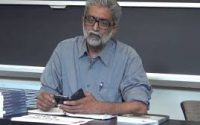$100 Website Offer
Get your personal website + domain for just $100.
Limited Time Offer!
Claim Your Website NowWhatsApp Snoopgate: RSS ideologue KN Govindacharya withdraws petition from Supreme Court.
Source – dnaindia.com
Rashtriya Swayamsevak Sangh (RSS) ideologue KN Govindacharya on Monday withdrew his petition from the Supreme Court asking for a probe by the National Investigation Agency (NIA) against Facebook, WhatsApp, and the Israeli firm, NSO, for an alleged snooping scandal that violated the privacy of Indian citizens. The petition was withdrawn after a Supreme Court Bench, headed by Chief Justice of India (CJI) SA Bobde, cited several mistakes in the petition and asked Govindacharya to withdraw such.
The RSS ideologue had approached the Supreme Court seeking direction to initiate perjury proceedings against WhatsApp for “misleading court in a case by claiming that user-data is fully encrypted and no one including WhatsApp has the key”. Govindacharya, the founder of the Rashtriya Swabhimaan Aandolan, had alleged that the Telecom Minister’s statement last week in the Rajya Sabha regarding the matter had not revealed the complete truth. For context, Union Minister of Electronics and Information Technology (IT) Ravi Shankar Prasad had claimed that no complaint has been made in the IT Ministry till date by anyone in the WhatsApp spyware snooping case. The Minister even argued that WhatsApp Inc is a company registered in the United States of America (USA) and has been doing business in India for ten years with an established office.
Contesting this claim, Govindacharya had sent a legal memorandum to the Ministry stating, “Till date, WhatsApp does not have an office in India. WhatsApp Application Services Private Limited is an Indian subsidiary, which has a separate corporate personality and has no control over the WhatsApp app being used by over 40 crore users in India.” He further highlighted the fact that a petition filed by his advocate on behalf of him on November 2 clearly sought an NIA investigation into the WhatsApp-NSO data leak and asked for perjury proceedings against WhatsApp and Facebook.
A third key point that Prasad raised in the Rajya Sabha was that WhatsApp has appointed a Grievance Officer in India to take care of users’ complaints. The petitioner categorically stated that the so-called Grievance Officer has been appointed in the US and not in India as stated by the Minister. For context, after being pulled up by the Supreme Court for not appointing a Grievance Officer and complying with other laws of India, WhatsApp had in September of last year appointed Komal Lahiri as the Grievance Officer for the country.
Based out of WhatsApp’s headquarters in Menlo Park, California, Lahiri can only be contacted via email and general post, the petition claimed, adding, “India with the biggest user base in the world has become a data colony as all our users’ data is going abroad,” said the petition.
The writ petition filed by Govindacharya in the WhatsApp-NSO Group snooping case was set to be heard in the Supreme Court on December 2.
Although snooping of WhatsApp through spyware Pegasus has perturbed the whole world, it has also created a political storm in India where the software was allegedly used to spy upon journalists, social activists, professors, and lawyers. The Opposition has alleged that the company sells this spyware merely to governments, and posed questions as to how it reached India and who bought it?
It is alleged that Indian journalists and activists were spied on Whatsapp through Pegasus which can seize every data present in any mobile device through a missed call. This Israeli malware attacked through WhatsApp’s video calling feature and targeted about 1400 people.
Notably, the case was first revealed in May 2019 when WhatsApp had filed a complaint in the district court of California in the USA against the NSO Group developing Pegasus. The social media company has also announced an immediate update on May 13, 2019.
WhatsApp has alleged that the NSO tarnished its image besides causing huge loss of over $75,000 (Rs 54 lakh).
WhatsApp has already filed a case against the Israeli firm – NSO Group – at a US Federal Court alleging the malicious cyberattacks with the spyware ‘Pegasus’, claiming the firm installed spyware on users’ phones and targeted human rights defenders, journalists, political dissidents, diplomats and government officials.



